“Hormonal changes around the time of menopause
can lead to anxiety and depression,
but other factors may also cause these feelings”.1
Umbrella
What may the Menopause Depression umbrella include?
Depending on the Source (DotS) this Umbrella may include:
- Clinical Depression
- Depression
- Depressive Disorder
- Major Depression
- Major Depressive Disorder
- Menopause Blues
Depression
What is depression?
DotS the definition of depression may vary. In Depressive Disorder (Depression): Overview, 31 March 2023, the World Health Organization’s definition is:
Depression is different from regular mood changes and feelings about everyday life. It can affect all aspects of life, including relationships with family, friends and community. It can result from or lead to problems at school and at work”.2
In Depression: What Is Depression? last reviewed March 2024, the (United States) National Institute of Mental Health’s (NIMH) definition is:
To be diagnosed with depression, the symptoms must be present for at least 2 weeks”.3
Sadness or Depression
Is sadness the same as depression?
In Depression In Women: 4 Things To Know the NIMH explain:
Perimenopause
Is there an association between perimenopause and depression?
In Depression In Women: 4 Things To Know – 3. Certain Types of Depression Are Unique To Women the NIMH note:
- “Perimenopausal Depression affects some women during the transition to menopause. Whereas abnormal periods, problems sleeping, mood swings, and hot flashes are common during the menopause transition, more extreme feelings of irritability, anxiety, sadness, or loss of enjoyment may be signs of depression”.5
In Symptoms of Menopause: Mood and Emotional Health the (Australian) Jean Hailes for Women’s Health (JH) elaborate on:
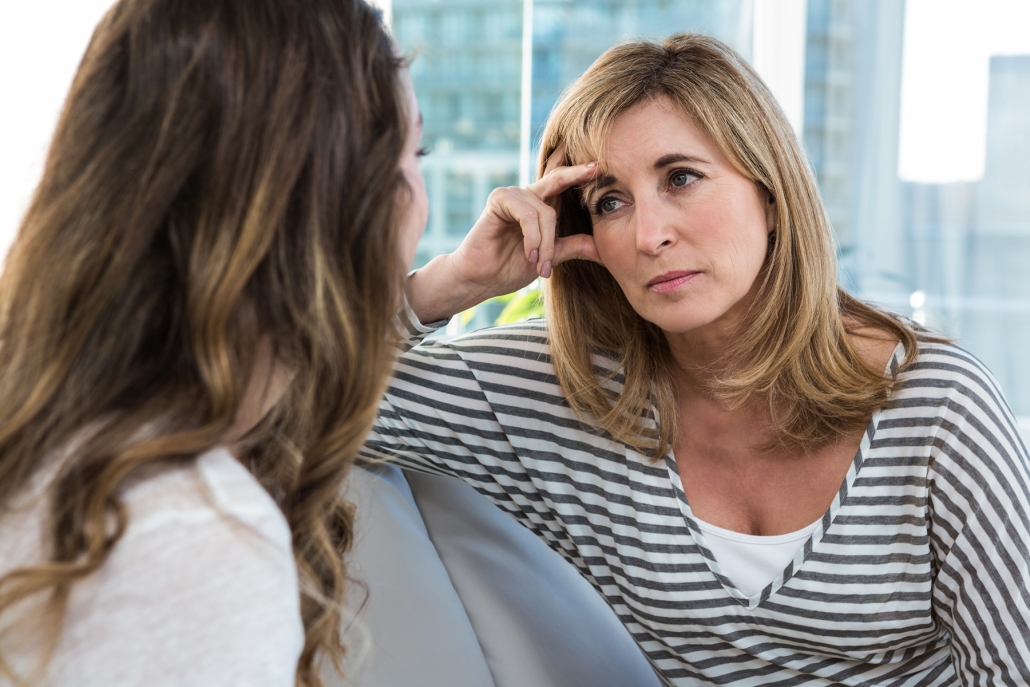 “Research suggests that women are more likely to feel depressed during the menopause transition.
“Research suggests that women are more likely to feel depressed during the menopause transition.
Women who have a history of depression or premenstrual syndrome (PMS) may be more likely to develop depression during this time”.6
Menopause
What are some mental health symptoms associated with menopause?
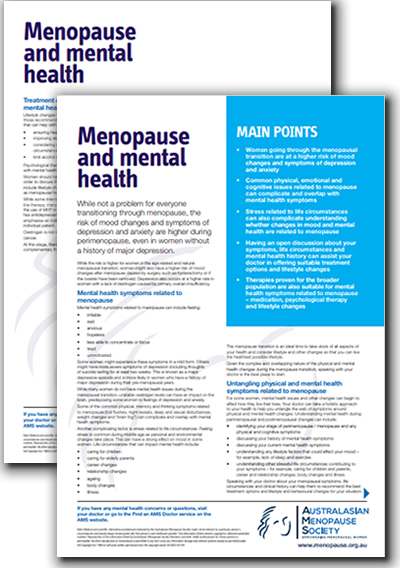 In Menopause and Mental Health: Mental Health Symptoms Related To Menopause, content updated February 2023, the Australasian Menopause Society (AMS) elaborate on:
In Menopause and Mental Health: Mental Health Symptoms Related To Menopause, content updated February 2023, the Australasian Menopause Society (AMS) elaborate on:
- Irritable
- Sad
- Anxious
- Hopeless
- Less able to concentrate or focus
- Tired
- Unmotivated
Some women might experience these symptoms in a mild form. Others might have more severe symptoms of depression (including thoughts of suicide) lasting for at least two weeks. This is known as a major depressive episode and is more likely in women who have a history of major depression during their pre-menopausal years.
While many women do not have mental health issues during the menopausal transition, unstable oestrogen levels can have an impact on the brain, predisposing some women to feelings of depression and anxiety”.7
Cause
What may cause depression during menopause?
On page 777 in The 2022 Hormone Therapy Position Statement of The North American Menopause Society: Depression, published July 2022, the North American Menopause Society note:
In Managing Your Symptoms: Managing Mood and Emotional Health – Anxiety and Depression the JH explain:
If you experienced anxiety before reaching menopause, some symptoms could make your anxiety worse. For example, hot flushes could lead to an anxiety attack.
Also, symptoms such as night sweats can affect your mood and make you feel exhausted, grumpy or depressed.
At this stage of life, you may experience depression for different reasons. For example, if you are having relationship problems or feeling more stress than normal.
You might also reflect on negative past experiences during this time, leading to feelings of depression”.9
In Mood and the Menopause, content updated 09 February 2023, the AMS elaborate on:
What is VMS?
VMS can be an abbreviation for Vasomotor Symptoms such as hot flushes and night sweats.
What is MDD?
MDD can be an abbreviation for Major Depressive Disorder.
What is FSH?
FSH can be an abbreviation for Follicle Stimulating Hormone.
Treatment
How may perimenopausal and menopausal depression be treated?
In Menopause and Mental Health: Treatment Options for Mental Health Symptoms the AMS elaborate on:
While some international guidelines do not recommend MHT as first line therapy, many doctors have seen a positive effect on mood with the use of MHT in the first instance. There is evidence that oestrogen has antidepressant effects, particularly in perimenopausal women. We emphasise an individualised approach with treatment tailored to the individual patient.
Oestrogen is not recommended for women with a history of breast cancer.
At this stage, there is no evidence to recommend alternative or complementary therapies for treatment of perimenopausal depression”.11
In Depression: A Major Challenge of the Menopause Transition, October 2022, Professor Kulkarni, Professor of Psychiatry at The Alfred Hospital, Melbourne; Head of Department of Psychiatry at Monash University, Melbourne; and Director of the Monash Alfred Psychiatry Research Centre, Melbourne, Victoria, explains:
Health Care Provider
What if I feel depressed?
If you feel depressed, it may be in your best interest to choose to talk to your health care provider abut this, soon as possible.
In Menopause and Mental Health: Untangling Physical and Mental Health Symptoms Related To Menopause the AMS elaborate on:
“Speaking with your doctor about your menopausal symptoms, life circumstances and clinical history can help them to recommend the best treatment options and lifestyle and behavioural changes for your situation”.13
In Menopause and Mind Health the JH remind us:
- You are experiencing strong emotions
- You think you have anxiety or depression
- Menopausal symptoms are impacting your quality of life
- Your brain fog is long lasting or stopping you from doing daily activities”.14
Health Topics A-Z
Where may I find Health Topics A-Z related to Menopause Depression?
In Health Topics A-Z you may find:
Links
Where may I find Links related to Menopause Depression?
Your Country may have Links similar to:
Links
This Links List to third party websites is neither comprehensive nor exhaustive. Inclusion on this Links List does not imply endorsement or recommendation. Non-inclusion on this Links List does not imply non-endorsement or non-recommendation. Third party websites are not under the control of Meno Martha International Menopause Directory. Third party websites may contain explicit medical images and/or sexual references. Please read Meno Martha International Menopause Directory’s Links Policy before proceeding to a Link. Please contact Webmaster if you experience a problem with a Link.New or Updated
- Does Menopause Hormone Therapy Improve Symptoms of Depression? Findings From A Specialized Menopause Clinic [28 February 2024]
- Exercising Your Way Out of Depression [15 February 2024]
- The Lancet: Series From the Lancet Journals – Menopause 2024 [05 March 2024]
- Therapy Could Be Effective Treatment for Non-Physical Symptoms of Menopause [28 February 2024]
- Video Series-2023: Premature and Early Menopause
- Video Series-2024: Preparing for Your Menopause Health Care Visit
- Anxiety Self-Help Guide
- Anxiety vs. Depression: Which Do I Have (or Is It Both)?
- Askearlymenopause.org [Ask EM] [+ Video: What Is Early Menopause?]
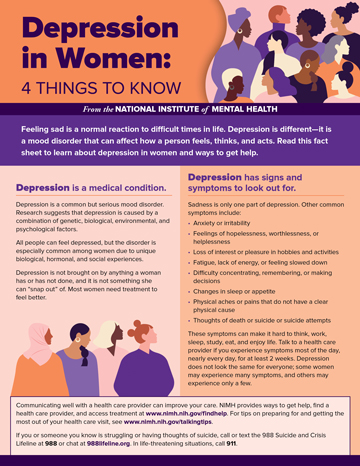 BMS TV: Sleep
BMS TV: Sleep- Boost Your Mood With Mind-Nourishing Food
- Can Massage Relieve Symptoms of Depression, Anxiety and Stress?
- Can Menopause Cause Depression?
- Cognitive Behaviour Therapy (CBT) for Menopausal Symptoms
- Deciding About Hormone Therapy Use
- Depression
- Depression
- Depression In Women: 4 Things To Know
- Depression [+ Video Courtesy: Mayo Clinic News Network]
- Depression and the Menopause
- Depression: A Major Challenge of the Menopause Transition
- Does Menopause Hormone Therapy Improve Symptoms of Depression? Findings From A Specialized Menopause Clinic
- Dr Louise Newson Breaks Down The Menopause & Lisa Snowdon Shares Her Experience | This Morning
- Effects of Nutritional Interventions on the Severity of Depressive and Anxiety Symptoms of Women In the Menopausal Transition and Menopause: A Systematic Review, Meta-Analysis, and Meta-Regression
- Emotional Wellness In Menopause
- Exercise for the Treatment of Depression
- Exercising Your Way Out of Depression
- Experts Urge Caution Over Study Linking Menopause Depression With Oral Hormones
- Facebook Live Event: The Menopause Transition and Depression
- Find A Menopause Practitioner [United States and Other]
- Find An AMS Doctor [Australasian Menopause Society i.e. Australia and New Zealand]
- Find Your Nearest BMS Menopause Specialist [British Menopause Society]
- Finding A Mental Health Professional
- Getting Help [United Kingdom]
- Headtohealth.gov.au: Head To Health [Australia]
- How To Talk To Your Doctor About Midlife Brain Fog
- I Forgot To Ask the Doctor – E17: Are Anxiety & Depression Destroying Your Life?
- Joint BMS FSRH RCGP RCOG SfE and RCN Women’s Health Forum Safety Alert
- Joint Position Statement By the British Menopause Society, Royal College of Obstetricians and Gynaecologists and Society for Endocrinology on Best Practice Recommendations for the Care of Women Experiencing the Menopause
- Later Years (Around 50 Years and Over): Menopause and Post Menopause Health – Early and Premature Menopause [+ Video: Menopause Only Happens In Your 50’s or Does It?] [Other Languages and Formats]
- Later Years (Around 50 Years and Over): Menopause and Post Menopause Health – Menopause and Your Mental Wellbeing [+ Video: Menopause Only Affects You Physically!] [Other Languages and Formats]
- Later Years (Around 50 Years and Over): Menopause and Post Menopause Health – Signs and Symptoms of Menopause [+ Video: Talking Menopause With Your GP] [Other Languages and Formats]
- Later Years (Around 50 Years and Over): Menopause and Post Menopause Health – Supporting Someone Through the Menopause [+ Video: Men Don’t Need To Know About Menopause] [Other Languages and Formats]
- Let’s Talk About Perimenopause
- Mastering Midlife Mood Changes With Marlene Freeman, MD
- Mayo Clinic Q and A: How To Support A Loved One With Depression
- Mayo Clinic Q and A: Perimenopause Transitions and Concerns
- Menopause
- Menopause
- Menopause Map: Downloadable Resources – My Personal Path Print Tools: Questions for Your Health Care Provider

- Menopause Map: Downloadable Resources – My Personal Path Print Tools: Symptom Tracker
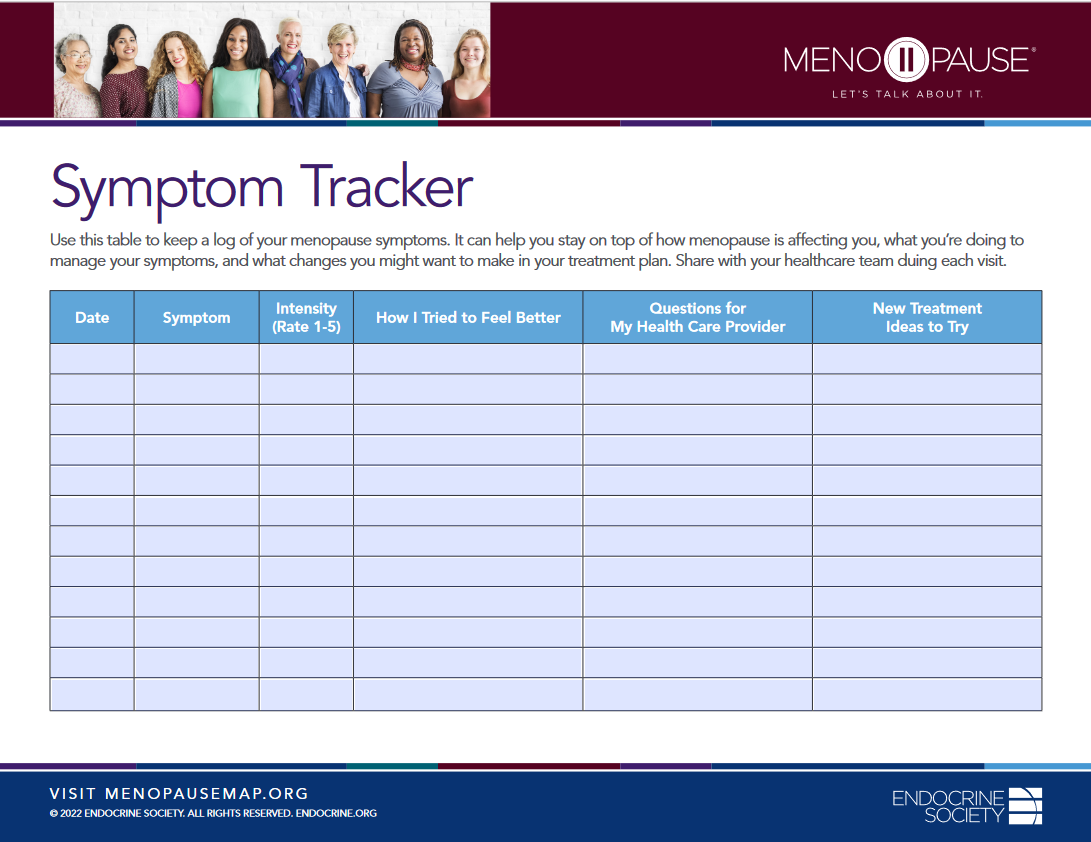
- Menopause Mindfulness: A Personal Toolkit for Menopause Preparedness
- Menopause Mindfulness: Embracing the Change of My Midlife
- Menopause Patient Information [Videos] 2. Talking To Your GP About Menopause
- Menopause Patient Information [Videos] 5. Lifestyle Advice In Menopause & Perimenopause
- Menopause Preparedness Toolkit: A Woman’s Empowerment Guide
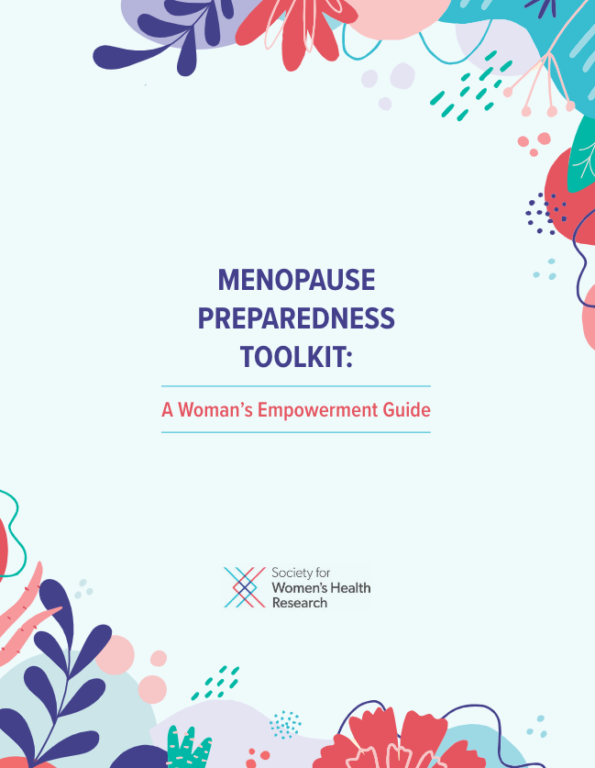 Menopause Symptoms: Mayo Clinic Expert Outlines Hormone and Nonhormonal Therapies
Menopause Symptoms: Mayo Clinic Expert Outlines Hormone and Nonhormonal Therapies- Menopause Treatments: What Works, What Doesn’t
- Menopause and Depression: Is There A Link?
- Menopause and Mental Health
- Menopause and Mental Health
- Menopause and Mind Health
- Menopause and Your Mental Wellbeing
- Menopause, Perimenopause, Hormone Therapy and Other Treatments With Madelyn Butler, MD [Podcast]
- Menopause: Things You Can Do
- Menopause: Understanding the Changes and Finding Relief | Dr Susan Davis | The Proof Podcast EP 256
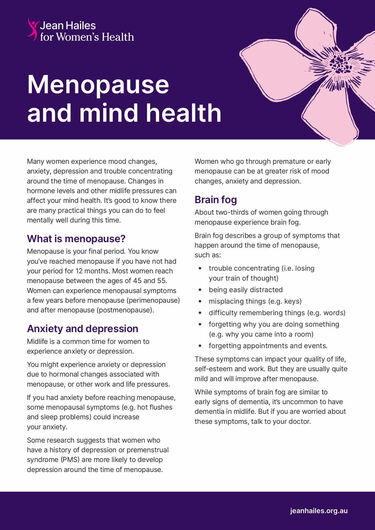 Mental Health: Mental Health Self Help Guides
Mental Health: Mental Health Self Help Guides- Mood and the Menopause
- Mymenoplan.org [My Menoplan, United States]
- National Center for Complementary and Integrative Health: Depression
- National Center for Complementary and Integrative Health: Herbs At A Glance
- National Center for Complementary and Integrative Health: How Safe Is This Product or Practice?
- National Institute of Mental Health: Depression
- Navigating Menopause: Expert Insights and Solutions | Dr Susan Davis | The Proof Podcast EP 245
- Navigating Menopause: Honest Answers To All Your Questions [+ Video: What To Expect in Menopause]
- Office of Dietary Supplements: Vitamin B6
- Perimenopause
- Perimenopause
- Perimenopause and Depression
- Perimenopause and Menopause Checklist: Translated Checklists
- Perimenopause and Menopause Symptom Checklist

- Promoting Good Mental Health Over the Menopause Transition
- SAMe
- Self-Help Tool: Menopause and Mental Wellbeing
- Should You Try an L-Tyrosine Supplement? A Look at Its Benefits and Side Effects
- Supporting A Loved One Through Menopause
- Taking Care of Your Mental Health
- The Truth About Menopause Supplements | Dr Sarah Berry
- Therapy Could Be Effective Treatment for Non-Physical Symptoms of Menopause
- Therapy for the Effects of Menopause
- Tips To Help Manage Menopause Symptoms
- Top Tips To Improve Your Mental Wellbeing
- Types of Therapist: How To Find & Choose A Therapist – What Is the Difference Between A Psychologist, Psychiatrist and Counsellor?
- Using Natural Therapies In the Menopause Transition – Webinar
- Video Series-2023: NAMS 2023 Nonhormone Therapies Position Statement for Bothersome Menopause Symptoms
- Video Series-2023: New FDA-Approved Nonhormone Option for the Treatment of Hot Flashes
- Video Series-2023: Premature and Early Menopause
- Video Series-2023: Racial and Ethnic Differences in the Menopause Experience
- Video Series-2024: Preparing for Your Menopause Health Care Visit
- Videos and Podcasts: Videos – Interviews: A Simple Approach To Menopause: The Menopause Quick Six (www.MQ6.ca)
- Videos & Podcasts: Videos – Interviews: Metabolic Syndrome in Midlife Women
- Webinars: Previous – Non-Hormonal Pharmacological Interventions For VMS
- Webinars: Previous – Non-Pharmacological Interventions For VMS
- What Everyone Should Know About Menopause Symptoms
- Why Depression In Women Is So Misunderstood
- Why Didn’t Anyone Tell Me This? Episode 3: Dr Annice Mukherjee: Your Essential Menopause Toolkit
Sources
Where may I find the Sources quoted?
You may find the Sources quoted at:
Sources
- Managing Your Symptoms: Managing Mood and Emotional Health – Anxiety and Depression. Last Updated: 19 December 2023 | Last Reviewed: 19 August 2022. Jean Hailes for Women’s Health https://www.jeanhailes.org.au/health-a-z/menopause/managing-your-symptoms#managing-mood-and-emotional-health Accessed: 21 April 2024
- Depressive Disorder (Depression): Overview. 31 March 2023. World Health Organization https://www.who.int/news-room/fact-sheets/detail/depression Accessed: 21 April 2024
- Depression: What Is Depression? Last Reviewed: March 2024. National Institute of Mental Health https://www.nimh.nih.gov/health/topics/depression/index.shtml#part_145398 Accessed: 21 April 2024
- Depression In Women: 4 Things To Know. Revised: 2023. National Institute of Mental Health https://www.nimh.nih.gov/health/publications/depression-in-women Accessed: 21 April 2024
- Depression In Women: 4 Things To Know – 3. Certain Types of Depression Are Unique To Women. Revised: 2023. National Institute of Mental Health https://www.nimh.nih.gov/health/publications/depression-in-women Accessed: 21 April 2024
- Symptoms of Menopause: Mood and Emotional Health. Last Updated: 28 March 2024 | Last Reviewed: 19 August 2022. Jean Hailes for Women’s Health https://www.jeanhailes.org.au/health-a-z/menopause/menopause-symptoms#mood-and-emotional-health Accessed: 21 April 2024
- Menopause and Mental Health: Mental Health Symptoms Related To Menopause. Content Updated: February 2023. Australasian Menopause Society https://www.menopause.org.au/health-info/fact-sheets/menopause-and-mental-health Accessed: 21 April 2024
- The 2022 Hormone Therapy Position Statement of The North American Menopause Society: Depression. Menopause: The Journal of the North American Menopause Society Vol: 29, No. 7, pp 767-794. North American Menopause Society https://www.menopause.org/docs/default-source/professional/nams-2022-hormone-therapy-position-statement.pdf Accessed: 21 April 2024
- Managing Your Symptoms: Managing Mood and Emotional Health – Anxiety and Depression. Last Updated: 19 December 2023 | Last Reviewed: 19 August 2022. Jean Hailes for Women’s Health https://www.jeanhailes.org.au/health-a-z/menopause/managing-your-symptoms#managing-mood-and-emotional-health Accessed: 21 April 2024
- Mood and the Menopause. Content Updated: 09 February 2023. Australasian Menopause Society https://www.menopause.org.au/hp/information-sheets/mood-and-the-menopause Accessed: 21 April 2024
- Menopause and Mental Health: Treatment Options for Mental Health Symptoms. Content Updated February 2023. Australasian Menopause Society https://www.menopause.org.au/health-info/fact-sheets/menopause-and-mental-health Accessed: 21 April 2024
- Kulkarni, J. Depression: A Major Challenge of the Menopause Transition. October 2022 https://medicinetoday.com.au/mt/2022/october/feature-article/depression-major-challenge-menopause-transition Accessed: 21 April 2024
- Menopause and Mental Health: Untangling Physical and Mental Health Symptoms Related To Menopause. Content Updated: February 2023. Australasian Menopause Society https://www.menopause.org.au/health-info/fact-sheets/menopause-and-mental-health Accessed: 21 April 2024
- Menopause and Mind Health: When To See Your Doctor. Updated: May 2023. Jean Hailes for Women’s Health https://www.jeanhailes.org.au/resources/menopause-and-mind-health Accessed: 21 April 2024



